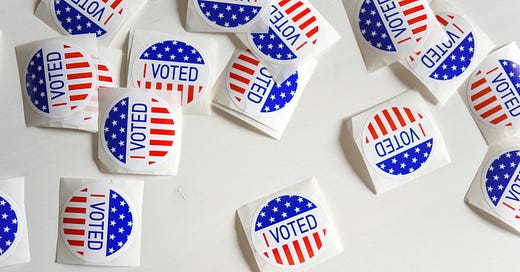What happened in energy policy on Tuesday?
Also, me in National Review: The Welcome Demise of Ranked-Choice Voting
Thank you this Veteran’s Day to all who have served.
Last week was a busy one for obvious reasons. I jotted down a few energy policies I was watching last Tuesday for American Experiment. It’s also worthwhile to read
’ “7 Quick Energy Takeaways from the 2024 Election.” I particularly liked the section about the Western Solar Plan, which I’ve written about extensively at Independent Women’s Forum.I also avidly watched the failure of several ballot measures nationwide which would’ve implemented ranked-choice voting. It’s a terrible election system that’s confusing, counterintuitive, and has ultimately worsened political polarization in my home state of Alaska. I wrote an op-ed in National Review about it; the first few paragraphs are below.
Lastly, catch me on Independence Institute’s Power Gab podcast to hear more about why Net Zero might be impossible without more minerals and better public policy.
What happened in energy policy on Tuesday?
All eyes were on the presidential election Tuesday, but energy had a big night, too, with some good things coming at the national and local levels. Now that the dust has settled a bit, here are a few highlights:
Oil prices dip, renewable stocks tank: Donald Trump’s anticipated rollback of burdensome oil and gas regulations affected oil prices yesterday, though foreign policy decisions may lead to price spikes. Mr. Trump may also repeal the subsidy-packed Inflation Reduction Act, which sent solar and wind stocks tumbling; one residential solar stock fell 51%. What does it say about an industry that it fears being unable to survive without billions, maybe trillions, of dollars in subsidies?
What’s next? After it became clear that Mr. Trump would win reelection, it didn’t take long for speculation on his cabinet picks to begin. Frontrunners for Interior Secretary and/or Energy Secretary are Gov. Doug Burgum (R., ND) and Gov. Mike Dunleavy (R., Alaska). Either would be excellent choices from energy-producing states that understand the barriers the federal government erects to stymie domestic natural resources projects. Perhaps one can lead Energy, the other Interior? One can hope.
Minnesota: The lottery amendment, which directs proceeds from the Minnesota lottery into a fund for various environmental projects, passed with 83% of the vote. The reauthorized program creates community grant programs to favor applicants “that are overburdened or underserved,” and prohibits wastewater treatment projects.
South Dakota: Voters rejected SB 201, a bill regulating carbon dioxide pipelines, through a ballot question with 59.4% of the vote. The bill would make it easier for pipeline companies to build projects by superseding local permitting restrictions. Summit Carbon Solutions plans to reapply for a permit in South Dakota on November 19 regardless of this loss at the ballot box.
Washington State: Voters in Washington rejected a ballot initiative that would’ve repealed the Climate Commitment Act, which requires “major polluters” to pay for carbon emissions by buying allowances. The number of allowances drops each year. The Washington Policy Center estimates that the program increases gasoline costs between 43 and 53 cents a gallon. Looks like Washingtonians are stuck with high gas prices for a while yet.
Washington State: However, another initiative, to ensure “access to natural gas in homes and other buildings and repeal a state law requiring plans to transition from the use of natural gas to electricity” seems like it may pass — although it’s still too close to call.
There was surely more going on Tuesday for energy, but on my short list, the future looks pretty bright.
This is from a piece originally published at Center of the American Experiment on 11/8/2024.
National Review: The Welcome Demise of Ranked-Choice Voting
Tuesday, Donald Trump secured his comeback to the White House. But Tuesday should also be remembered as the day that ranked-choice voting died — except in Washington, D.C., where bad ideas live in perpetuity.
Alaskans voted on Tuesday on whether or not to repeal the state’s ranked-choice voting system. In 2020, Alaskans approved a 25-page initiative promising a better elections process and the elimination of “dark money” influence in campaigns. The initiative, financed by national progressive advocacy groups under the banner of Alaskans for Better Elections, passed by a margin of about 3,700 votes. Maine has used ranked-choice voting in statewide elections since 2016.
In Alaska’s version of ranked-choice voting, the four candidates receiving the most votes advance from a choose-one nonpartisan primary. If a candidate receives more than 50 percent of first-place votes, he or she wins; if no candidate gets a majority of first-choice votes, counting proceeds in rounds in which the candidate with the fewest votes is eliminated. Voters whose highest-choice preference was eliminated have their vote transferred to their next-highest preference.
When Don Young died in 2022, Alaskans were flung into a special election. Forty-eight candidates entered the primary, and the top four advanced to the general election, though only after some legal jockeying to determine whether the fifth-place candidate could replace a candidate that had dropped out. Two Republicans split their first-choice votes, tallying 60 percent together, and therefore the “consensus” candidate, Mary Peltola (D., Alaska), won.
A simple process with a simple outcome, right? Not quite.





What ever Mr. Trump does, he'd better get it right the first time. We have two years, that's all. We screw up this opportunity, well, back to Biden II